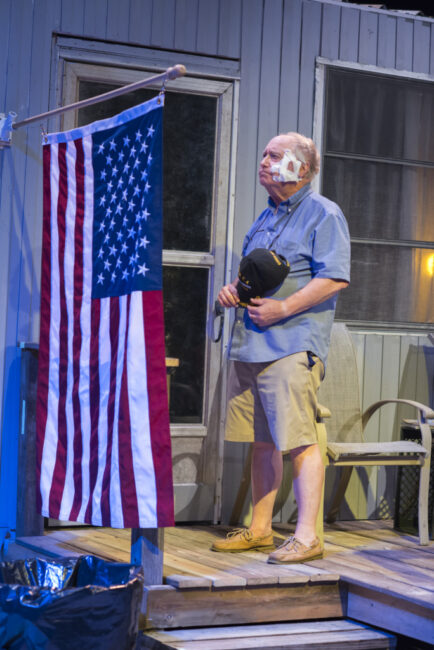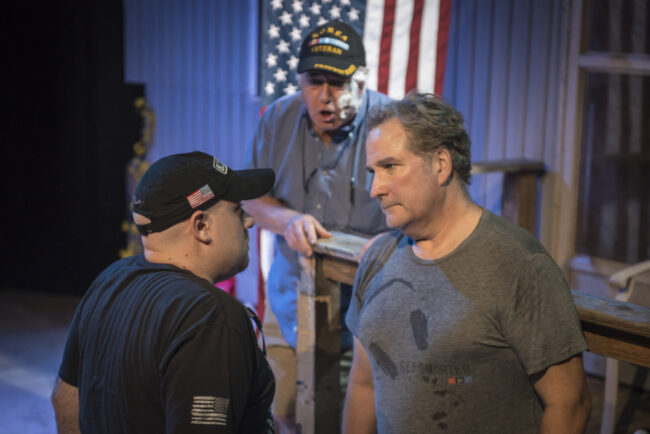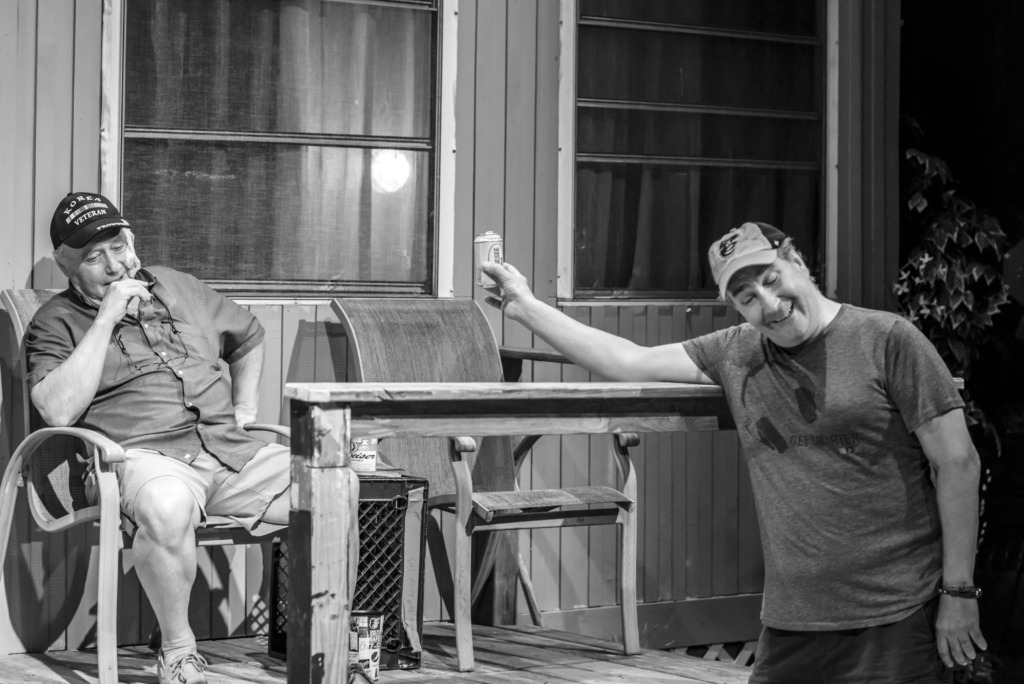author: Chris Pence
What defines success? The American Dream? Career goals? Personal satisfaction? Baltimore playwright Mark Scharf examines these queries and more in The Monroe Doctrine, a new play making its world premiere at The Baltimore Theatre Project. The play centers around the Monroe Family, a typical American family hoping to celebrate Memorial Day 2014 with the Traditional Monroe Family Memorial Day Picnic on Hog Island, Maryland. Through family arguments and personal reflections, the Monroes debate many of the issues facing the average American, in the hopes that they will be able to measure their successes against that of their peers and themselves. Scharf’s narrative presents a frank, realistic view of modern America, plumbing the souls of his characters to create an understandable, authentic family to which the audience can relate.

Producers Larry Lambert and Marianne Gazzola Angelella (Vest Pocket Productions) bring the new production to Baltimore via The Baltimore Theatre Project, and The Maryland State Arts Council. Director Ann Turiano expertly leads the cast and crew to present a painfully genuine view of the typical American family. Her direction creates in the characters a reality unrivalled by very few modern productions. Bruce Kapplin’s well-developed set design pulls the audience into the Monroe trailer park home, with a trailer façade large enough to portray the claustrophobia and disappointment the characters face in their new home. The set includes a satellite dish, a small picnic area with picnic table, and some strategically placed pink flamingoes, creating a quaint yet cluttered environment for the show’s performance space. Hunter King’s set dressing and prop management add to the scene, with stage manager Jesse Lescallette and his crew (Dominique Solomon and Breanna Stewart). A particular highlight of their proficiency is the strewing of beer cans across the set for the beginning of Act II, showing the passage of time and the stress that the family faces. These are skillfully removed during the production by various characters, who do their best to declutter their jumbled lives as they remove the mess that litters their home. A slight slipup for the prop crew would only be caught by the keen eye of a true Baltimore Orioles fan: a cup celebrating the 30th anniversary of Camden Yards, which wouldn’t be celebrated for another few years after the events of the show. (Yeah, I know it’s nitpicking, but when a reviewer can take the time to notice miniscule details like this, it’s a pretty good sign).
Heather Johnston distinctive touch in costume design brings the characters into their setting with aptitude. Band t-shirts, Orioles caps and ripped jeans emphasize the characters’ troubles, including Tedward’s amateurly bandaged face, from his recent incident crashing the family car. Charles “Chuck” Atwell’s lighting design proves that less is more, using faint fading to replicate the sun rising, and thus, the passage of time between scenes. Atwell, along with the help of light board operator Maya Strauss, also creates an interesting new dynamic by lighting the stage with little more than a few camping lanterns to portray Crane and Madison drunkenly sneaking back onto the property in the middle of the night. Alex Perry’s sound design also does well to set the scene. Though some of the sound effects are a little unrealistic, Perry makes up for it in real time, with background wilderness noises that sneak in so stealthily that the audience can’t help but be sucked into the secluded countryside where the Monroe trailer resides. Perry also does well to include well-timed, varied ringtones for each character. Larry Malkus rounds out the production team with practical, not flashy fight choreography, which feels true to the characters and their setting.
To quote comedian George Carlin, “The reason they call it the American Dream is because you have to be asleep to believe it.” Scharf’s characters debate the measure of success and the realities of searching for the American Dream, with Turiano’s cast adding the perfect level of truth and relatability to the characters. At curtain rise, the audience meets Tedward Monroe, a Korean War veteran and the patriarch of the Monroe family, as portrayed by John Covaleskie. Covaleskie does wonders with the role, creating in Tedward the ideal grumpy old man. Sarcastic and funny, yet troubled, Tedward is the typical grandfather figure that every American knows. Removed from his nursing home with the help of his son Real, Tedward rails against doctors and VA hospitals, and misses his friends lost in the war. He is critical of his son, yet clearly loves him and wants the best for him. Living in the trailer with Real, Tedward is just waiting for his turn to die, yet he’s not going without a fight. A great mix of levity and depth, Covaleskie’s Tedward is quick with a quip, but tugs at the audience’s heartstrings with stories about the hell of war late in the show. His sarcasm masks his insecurities, and Covaleskie brings a familiar sympathy to the old man that we all know earned his right to be grumpy.

Tedward’s son Real (Michael P. Sullivan) drives much of the narrative. The son of Tedward, and father of Dylan and Crane, Real is a divorced poetry teacher trying to find his place in the world, and wonders why he hasn’t found the success he so strongly desires. Sullivan portrays Real as the Average Joe, who is often the primary reason for his own undoing. Though he clearly has a higher level of intellect than most, as evidenced by his tendency to always find applicable quotes from Whitman, Thomas, Shakespeare, and other great writers, Real struggles with many of the real-world problems that come his way. Overly dramatic and distressed, Sullivan’s Real portrays a truth that most Americans find in themselves. Real’s relationship with his father is strained by their checkered past and Real’s own resentment for himself and his treatment of his own children. The generational gap between Real and his father comes to a head when Real recounts a moment when Tedward used physical punishment against him as a child, which Tedward claims not to remember, as it had been so long ago. Sullivan brings the perfect balance of emotion to Real, a man who fears becoming his father, and blames everyone around him for his own troubles, unable to let anything in his past go.
Real’s dedication to following his own dream is framed in the story of his son Crane, as played by Griffin DeLisle. Named after Real’s military buddy who committed suicide, Crane is the perfect image of his father, even quoting many of the same poets as Real, and sharing much of his slightly dented sense of humor, including shouting the patented Baltimore “OH!” during the National Anthem, and making an unintentionally racist joke at Abbie’s expense. He is constantly compared to his father, leading to a Quarter-Life crisis during which he blames his father for poor advice in telling Crane to go for his dreams. DeLisle ignites a fire in the young adult, who rebels against his father for their constant arguing about his parents’ divorce. An angry young man searching for his own identity, DeLisle’s Crane brings the struggle of the family to the younger members of the audience, with the staggering grace of a young man trying to find his place outside of his father’s shadow.
Makeima Freeland, as Crane’s girlfriend Madison, expertly depicts the awkward outsider brought into the middle of the argument long after they had a chance to form an opinion. A former girl scout, Madison is respectful to elders, and easily gains Tedward’s respect. She also is quick to defend her own beliefs, as she takes a stand against Real’s opinions regarding the Civil War, and Dylan’s defense of unsanctioned police actions. Freeland makes herself known in every scene, and expertly portrays Madison’s confidence in herself, showing how easily one can lose their temper in heated situations.

Oscar Wilde once said that “In this world there are only two tragedies. One is not getting what one wants, and the other is getting it.” Real’s oldest son Dylan (Nick Cherone) personifies this idea like no other. Nicknamed “Dee,” Dylan is a gruff, angry police officer who comes to the picnic just to hurt his father. He easily finds fights to pick with everyone present at the picnic, calling his brother a hippie for having long hair, and defending police actions against Madison’s frustration toward the police. Cherone doesn’t spend much time in the spotlight, but he commands the stage for every second of his performance. From the second the audience sees him, they feel the anger burning in Dylan, and his longtime resentment for his father, who uses Dylan as a scapegoat to keep arguments about the divorce alive, thanks to a letter sent to Real courtesy of Dylan’s long deceased mother. Dylan vows to disown his father and his family. Dylan goes berserk and trashes the set when Real reveals a secret to his son about who he truly is, showing the instability and violence that hate brings. Threatening and dark, Cherone is the yin to DeLisle’s yang, showing a man who has already made his way, despite not knowing all there is to know about himself.
Real’s frustration toward his career comes through his relationships with Abbie and Donna. Abbie (Yodelle Tan) is a student of Real’s poetry class. A motorcycling feminist, Abbie is the teacher’s pet, creating a strange dynamic in her relationship with Real. When her feminism threatens their friendship (and his job), Real discredits her, turning to Donna, a professional friend, for advice. Tan is the quintessential college student, following likeminded students in their views, and not understanding the reactions that follow when the targets of their frustration discredit them. Tan presents Abbie with poise and respect, giving her character a strong, yet unsure, voice, and avoiding the typical tropes associated with socially conscious college students.
Anne Hammontree’s Donna presents a flawless contrast to Tan’s youthful yet oblivious college student. Donna clearly cares about Real, pressuring him to get his doctorate in order to become a full-time professor and better his career. Sassy and charming yet professional, Donna would be the perfect love interest for Real, frequently dropping less-than-subtle hints that she wants more than a professional relationship. When his relationship with Abbie falls to pieces over differing views of gender in the classroom, Real takes advantage of Donna’s optimism for him in order to scapegoat her for his career failures. The classic career woman, Hammontree offers Donna as a great opportunity lost for Real’s personal and career lives. With professional care, she presents the show’s most memorable line, “You love your problems, you wear them like medals,” which one could argue is the true message of the play.

Scharf adds a special level of realism to the show in some of the shortest exchanges. At several points in the show, a character expresses an opinion that would typically cause an argument but is ignored with some prejudice by the triggered character. For example, when Abbie expresses that her grandparents were Korean, and came to America after the war, she expresses the opinion that she doesn’t understand why they would have come to America knowing how they would be treated. Though Tedward shoots her an unseen dirty look, he chooses to recuse himself into the trailer, ignoring the argument that he knows he can’t win. The cast handles these exchanges cleverly, always portraying some sort of nonverbal reaction, but avoiding the oncoming fight, as we’ve all needed to do in tense situations, especially those with family.
Poignant and genuine, The Monroe Doctrine leaves the audience with a lot to think about, both in how to measure success, and how they impact that success.
Running Time: 2 hours and 15 minutes with one intermission
The Monroe Doctrine plays through August 31st 2024 as a Vest Pocket Productions at Baltimore Theatre Project— 45 W. Preston Street in Baltimore, MD. Tickets are available by calling the box office at 410-752-8558 or by purchasing them in advance online.
To check out the ever-rotating schedule of live entertainment at Baltimore Theatre Project, click here.

